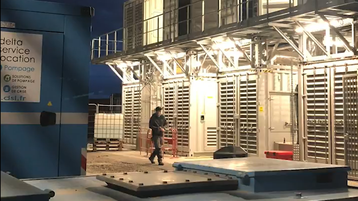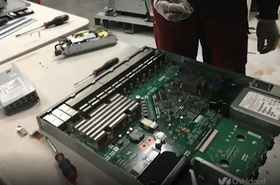Firefighters briefly returned this morning to OVHcloud's Strasbourg site where the SBG2 data center burnt down on March 10, according to tweets from the company's founder, Octave Klaba.
At 7am CEST, Klaba tweeted that there was a fault in one of the uninterruptible power supplies (UPSs) in SBG3, the main focus of OVHcloud restart efforts. The unit had been shut down and firefighters called. By 7.30 the site was given a clean bill of health and work has restarted. The date has caused at least one person reading the tweets to ask: "Heu... Poisson d'avril ?"
For breaking data center news, features, and opinions, subscribe to DCD's newsletter
No smoke, no fire
"The firefighters came and checked the temp everywhere: no smoke, no fire. They left the site," said a 7.15am tweet from Klaba. "On the front of this UPS, we see that the small filter is burnt. I won’t give any fast conclusion. No impact on the services."
The incident began when a security patrol spotted a problem with one of the SBG3 UPSs: "This morning at 6am, they felt something strange in the air and found out it’s coming from UPS11T3. We immediately bypass/shutdown the UPS and we called the firefighter," Klaba explained.
In his most recent tweet, he says: "We called the supplier to check this UPS. The teams are back in SBG3. We continue the operations."
UPS systems have figured repeatedly in the saga of OVHcloud's campus where a fire destroyed SBG2 and damaged SBG1 so badly that OVHcloud abandoned efforts to restart it.
The original fire took place the night after a UPS system was maintained by its supplier, and Klaba tweeted that UPS systems in SBG2 burned during the conflagration. A second, non-destructive, fire took place a few days later in disconnected UPS batteries in a room at SBG1.
The full cause of the original incident has still not been declared, as it is the subject of an investigation by police and insurance experts. Klaba has promised to set up a lab to explore how fire prevention systems work (or don't work) in data centers, pointing out that different fire prevention standards are required in different parts of the building, and sometimes different countries mandate different kinds of protection.
Meanwhile, work continues to restart services for web hosting customers, as well as three separate "cloud" services: a public cloud running on the OpenStack open source cloud platform, private clouds for enterprise customers running on VMware's vSphere, and bare metal servers. Some customers apparently have no backups, or have misunderstood the level of backup provided: Klaba has promised that in future, customers will get free backups as part of their service.




